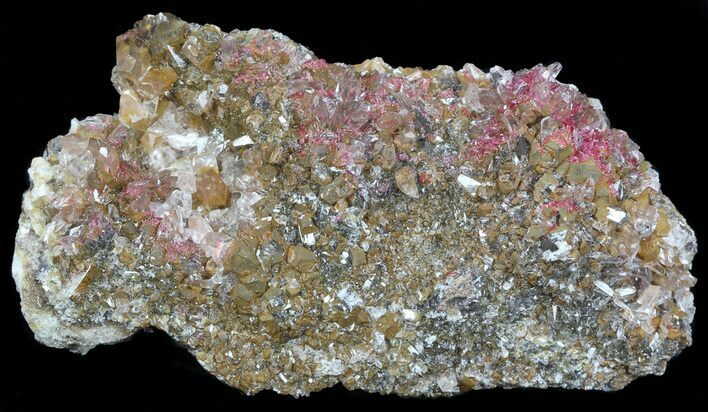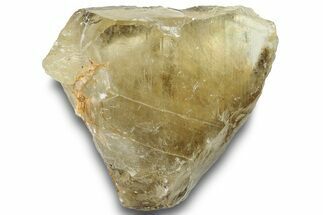This Specimen has been sold.
3" Roselite and Calcite Crystals - Morocco
This specimen contains magenta-pink roselite crystals between beautifully terminated calcite crystals.
Roselite is an arsenate mineral in the monoclinic crystal system. It gained its name not from the rose color it generally exhibits, but was in fact named in honor of a German mineralogist by the name of Gustav Rose. However, the name is quite fitting, since roselite typically displays a vitreous rose-red to pink color. Darker crystals have been known to frequently display marked color zoning due to variations in molecular composition.
Roselite has the chemical formula Ca2Co(AsO4)2 · 2H2O, meaning it contains arsenic. While it doesn't pose an immediate health risk from purely handling, ingestion in significant amounts and/or crushing and inhaling roselite can be toxic. For this reason, we suggest washing hands after handling and keeping out of reach of children.
Roselite has the chemical formula Ca2Co(AsO4)2 · 2H2O, meaning it contains arsenic. While it doesn't pose an immediate health risk from purely handling, ingestion in significant amounts and/or crushing and inhaling roselite can be toxic. For this reason, we suggest washing hands after handling and keeping out of reach of children.
About Calcite Crystals
Calcite crystals are a form of calcium carbonate (CaCO₃) known for their diverse shapes, transparency, and vibrant range of colors. They typically form in rhombohedral, scalenohedral, or prismatic shapes, often with well-defined, sharp edges and glossy surfaces. Calcite crystals are often translucent or transparent, sometimes displaying a double refraction effect where objects viewed through the crystal appear doubled. They can appear in various colors—white, clear, yellow, pink, blue, green, and orange—depending on impurities or trace minerals.
A notable characteristic of calcite is its reaction with weak acids like vinegar, which causes it to effervesce, or fizz, as it releases carbon dioxide. This property makes calcite crystals a key tool in geological identification and studies. Calcite forms in many environments, from sedimentary rocks like limestone and marble to hydrothermal veins.
Calcite crystals are a form of calcium carbonate (CaCO₃) known for their diverse shapes, transparency, and vibrant range of colors. They typically form in rhombohedral, scalenohedral, or prismatic shapes, often with well-defined, sharp edges and glossy surfaces. Calcite crystals are often translucent or transparent, sometimes displaying a double refraction effect where objects viewed through the crystal appear doubled. They can appear in various colors—white, clear, yellow, pink, blue, green, and orange—depending on impurities or trace minerals.
A notable characteristic of calcite is its reaction with weak acids like vinegar, which causes it to effervesce, or fizz, as it releases carbon dioxide. This property makes calcite crystals a key tool in geological identification and studies. Calcite forms in many environments, from sedimentary rocks like limestone and marble to hydrothermal veins.
SPECIES
Roselite & Calcite
LOCATION
Bou Azer District, Morocco
SIZE
3" long, 1.6" wide
CATEGORY
ITEM
#57147
 Reviews
Reviews














